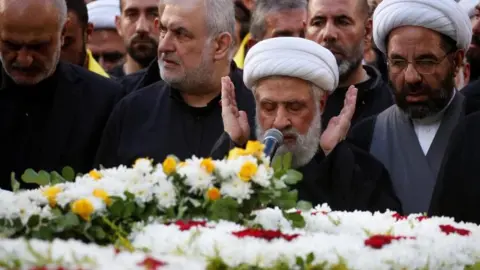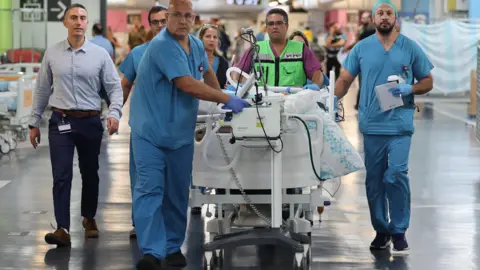Israel and Hezbollah both threatened to increase their cross-border attacks on Sunday, amid international appeals for them to step back from all-out war.
Israel’s military said about 150 rockets, missiles and other projectiles were fired at its territory overnight on Saturday and early on Sunday – mostly from within Lebanon.
Some reached further than previous strikes, sending thousands of Israelis to bomb shelters and damaging homes near the city of Haifa.
Israel launched its own strikes on targets in southern Lebanon, which it said destroyed thousands of Hezbollah’s rocket launchers.
On Sunday, Prime Minister Benjamin Netanyahu said Israel would take “whatever action is necessary to restore security” and return people safely to their homes along the Israel-Lebanon border.
He said Israel had dealt “a series of blows on Hezbollah that it could have never imagined”. But the group’s deputy leader Naim Qassem declared: “Threats will not stop us… We are ready to face all military possibilities”.
Speaking at the funeral of Ibrahim Aqil, a high-ranking Hezbollah commander killed in Israel’s Friday strike on Lebanon’s capital, Beirut, he said: “We have entered a new phase, namely an open reckoning” with Israel.
Lebanon said a total of 45 people, including children, were killed in the Beirut attack.
Hezbollah is a politically influential Shia Muslim organisation which controls the most powerful armed force in Lebanon. Fighting between the group and Israel escalated on 8 October 2023 – the day after the attack on Israel by Hamas gunmen from Gaza – when Hezbollah fired at Israeli positions.
 reuters
reutersThe latest cross-border exchanges have sparked renewed international concern.
UN chief Antonio Guterres told CNN he feared “the possibility of transforming Lebanon [into] another Gaza”.
The UN special coordinator in Lebanon, Jeanine Hennis-Plasschaert, posted on X that the Middle East was on the brink of “imminent catastrophe”.
“It cannot be overstated enough: there is NO military solution that will make either side safer,” she posted on Sunday.
The White House said military escalation was not in Israel’s “best interest”. The EU said it was “extremely” concerned, while UK Foreign Secretary David Lammy called for an “immediate ceasefire”.
The Israel Defence Forces (IDF) said many of the projectiles it faced had been intercepted overnight on Saturday, including two that had been launched from Iraq.
The Islamic Resistance in Iraq, a Iran-backed group, said it had fired cruise missile and explosive drone attacks at Israel.
Northern Israel remains on high alert, with schools closed and hospitals moving patients underground. People there have been told to restrict outdoor gatherings to fewer than 10.
One resident of Kirayt Bialik on the outskirts of Haifa, which was hit by rocket fire, told Reuters news agency: “Around 06:30 there was an alarm and then immediately afterwards a big explosion – very, very big explosion – even three or four houses from here. Our window in the main room was completely destroyed.”
 EPA
EPAEarlier this week, 39 people were killed and thousands wounded after pagers and walkie-talkies used by Hezbollah, the politically-influential Iran-backed organisation, exploded on two days across Lebanon.
On Thursday, Hezbollah leader Hassan Nasrallah blamed Israel for the attacks, saying it had crossed “all red lines” and vowed “just punishment”. Israel has not claimed responsibility.
As fears increase that the conflict may break out into a full-scale war, the US state department issued new travel advice for citizens currently in Lebanon.
The US embassy in Beirut urged people to “depart Lebanon while commercial options still remain available”.
Neighbouring Jordan’s foreign ministry issued similar advice to its citizens, urging those in Lebanon to leave as soon as possible.

